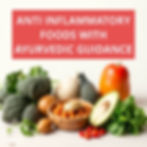🌿 Anti-Inflammatory Foods in Ayurveda: Eat Right for Your Prakriti
- Chakrakosh
- Sep 25, 2025
- 2 min read
डॉ. ज़ेबा नाज़ | Dr ZebaNaaz
BAMS, B.Sc, Endocrinologist, Panchkarma Therapist, Yoga Trainer

🌿 Anti-Inflammatory Foods in Ayurveda: Eat Right for Your Prakriti
Chronic inflammation is one of the silent roots of modern health problems — from PCOS, thyroid imbalance, infertility, diabetes, arthritis, obesity to autoimmune disorders. Modern nutrition highlights antioxidants, omega-3 fatty acids, and fiber as key players in reducing inflammation, while Ayurveda goes deeper by balancing agni (digestive fire), clearing ama (toxins), and eating as per your prakriti (vāta, pitta, kapha body type).
✅ Best Anti-Inflammatory Foods
Vegetables: leafy greens, beetroot, pumpkin, carrots.
Fruits: amla, pomegranate, papaya, berries.
Whole grains: barley, quinoa, old rice.
Nuts & seeds: soaked almonds, walnuts, flax, pumpkin seeds.
Proteins: mung dal, masoor dal, light lentils.
Fats: ghee, coconut oil, olive oil (in moderation).
Herbs & spices: turmeric, ginger, cinnamon, tulsi.
Beverages: ginger tea, tulsi tea, warm water.
⚖️ Contraindications According to Prakriti
Vāta: avoid excess raw cabbage, cauliflower, sprouts, carbonated/cold drinks.
Pitta: limit citrus, chili, garlic, fermented foods, alcohol.
Kapha: avoid bananas, dairy-heavy meals, fried foods, and sweetened drinks.
🌿 Ayurvedic Chakrakosh Support
Diet works best when supported by herbal formulations that pacify inflammation and balance doshas:
Cystsafa – for PCOS, cysts, endometriosis.
Nashtartav – regulates irregular periods.
Thyro Zen – supports thyroid balance.
Gluco Balance – for diabetes & insulin resistance.
Parous Churna – improves ovulation & uterine health.
❓ Frequently Asked Questions (FAQs)
1. Which food reduces inflammation fastest?
Fresh amla, turmeric, and ginger are considered the quickest Ayurvedic anti-inflammatories. In modern research, berries and omega-3-rich foods (like flaxseeds, walnuts, fish) also reduce inflammation rapidly.
2. What is the best Ayurvedic herb for inflammation?
Turmeric (Haridra) is the gold standard. When combined with black pepper and ghee, its absorption increases significantly. Tulsi, guduchi (giloy), and ashwagandha are also powerful anti-inflammatory herbs.
3. Can anti-inflammatory foods help with PCOS and infertility?
Yes. PCOS and infertility are linked to chronic low-grade inflammation. Including foods like amla, pomegranate, turmeric, and mung dal helps reduce inflammation. For deeper results, Ayurvedic support like Cystsafa and Parous Churna (Chakrakosh) is recommended.
4. Which foods should be avoided to reduce inflammation?
Avoid refined sugar, deep-fried foods, excess dairy, processed snacks, alcohol, and excess red meat. In Ayurveda, these create ama (toxins) and block channels.
5. How do I know which anti-inflammatory foods suit my prakriti?
Vāta: prefer warm, soupy, oily foods; avoid raw/cold foods.
Pitta: choose cooling, mildly sweet foods; avoid chili, garlic, and sour.
Kapha: light, bitter, pungent foods; avoid heavy, oily, and sweet.
✨ Final Word
Food can be medicine when chosen wisely for your prakriti. A tailored Ayurvedic diet with the right herbal support can restore balance, reduce inflammation, and protect long-term health.
📞 Consult Dr. Zeba Naaz (Chakrakosh Founder) for a personalized Ayurvedic plan.
🌐 Visit: www.chakrakosh.com | 📱 WhatsApp: 9068932258 | 📲 Instagram: @chakrakosh_official
⚠️ Disclaimer: This article is for educational purposes only and not a substitute for medical advice. Always consult a qualified Ayurvedic physician before starting any new diet or herbal supplement.
